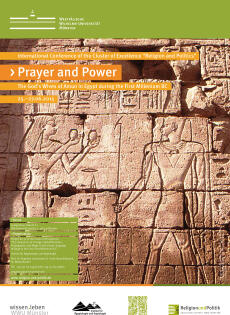The God’s Wife of Amun was the highest-ranking priestess in Ancient Egypt. Since the New Kingdom, about 1550 BC, it was an important religious institution centered in Thebes. Several queens are attested holding the title of a God’s Wife of Amun. But with the religious changes in the Amarna-Period the title fell out of favour.
During the 10th-8th centuries BC the title of the God’s Wife of Amun was revived, and in the following 200 years (8th-6th centuries) the institution gained in religious, political and economic influence. The princesses were expected to remain unmarried and to adopt a daughter of a next king as their heiress. Therefore the choice of the sacerdotal successor had a political dimension: as the royal palace and capital was in the northern part of Egypt, the God’s Wife acted as the substitute of the king in the southern part of Egypt. She took a royal titulary with names in two cartouches and had the authority to build chapels in Karnak and mortuary edifices in Medinet Habu. As the head of Theban theocracy, she controlled one of the largest economic centers in Egypt of that time. Within this economic network she integrated the top-level families of the Theban aristocracy. But her major duty was her active involvement in the temple ritual: she performed offerings in front of Amun. Moreover, she participated in rituals that asserted the king’s territorial authority as well as Amun’s universal power.
The conference will focus on the heyday of the institution of the God’s Wives, the influence and power of these women, as well as their social and economic context. It combines contributions from current research on the God’s Wives of Amun in the Third Intermediate Period as well as the early Late Period in Egypt. Individual personalities as well as the influence of femininity in general will be addressed. Moreover, questions concerning their artistic representation and their building activities will be discussed. The aim of the conference is to enhance dialogue about different religious, political and social aspects of the God’s Wives of Amun and to shed light on this powerful institution.
Programme
Thursday, 25.06.2015 |
||
| 18:15-18:30 | Greetings | Angelika Lohwasser, Anke I. Blöbaum, Meike Becker, Münster |
| 18:30-19:30 | Gender, Ritual, and the Manipulation of Power: The God’s Wife of Amun (Dynasty 23-26) | Mariam Ayad, Cairo |
Friday, 26.06.2015 |
||
| 09:00-09:15 | Introduction | Angelika Lohwasser, Münster |
| 09:00-09:45 | The Relationship Between the Libyan Period Rulers and Thebes | Raphaële Meffre, Paris |
| 9:45-10:15 | Female influence during the Third Intermediate Period besides the God’s wives | Meike Becker, Münster |
| 10:45-11:15 | Karomama revisited | Claus Jurman, Vienna |
| 11:15-11:45 | A God’s Wife at Heracleopolis | Olivier Perdu, Paris |
| 11:15-11:45 | Discussion | |
| 14:00-14:30 | The sphinxes of Shepenwepet II | Wienke Aufderhaar, Münster |
| 14:30-15:00 | The iconography of prayer and power: portrayals of the God’s Wife Ankhnesneferibre in Osiris chapels at Karnak | Aleksandra Hallmann, Warsaw |
| 15:00-15:30 | Discussion | |
| 16:00-16:30 | Between Amun and Osiris: Reassessing the place of the God’s wives in the decorative scheme of the Osiris chapels at Karnak | Laurent Coulon, Lyon |
| 16:30-17:00 | Between tradition and innovation: the Hw.t-kA of the God‘s Wives | Carola Koch, Würzburg |
| 17:00-17:30 | Discussion | |
Saturday, 27.06.2015 |
||
| 09:00-09:30 | Historical and art historical questions: late Libyan and Kushite God’s Wives | Robert Morkot, Exeter |
| 09:30–10:00 | “Nubianess” and the God’s Wives of Amun: Institution, Persons, Reflections | Angelika Lohwasser, Münster |
| 10:30-11:00 | Family affairs: Relations between the family of Monthemhet, the clergy of Amun and the God’s Wives | Anke I. Blöbaum, Münster |
| 11:00-11:30 | The God’s wife at the beginning of the 26th Dynasty: A religious function to assert political power | Claudia Maderna-Sieben, Heidelberg |
| 11:30-12:00 | Research in TT 391 | Erhart Graefe, Münster |
| 12:00-12:30 | Discussion | |
| 14:00-15:00 | Discussion | |


